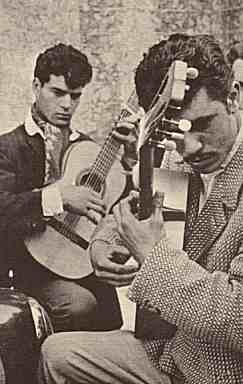This site is about traditional flamenco music.
But it's also about where flamenco is going.
 No sensible person would try to
define where traditional ends and modern begins.
Sabicas played traditional music but he also played
some pretty unusual stuff that could hardly be defined
as flamenco. However, I think it would be fair to say
that before Paco de Lucia introduced his sextet to the
world, complete with flutes, bongos and fretless
electric bass, the average person on the street had a
rough idea of what flamenco was about.
No sensible person would try to
define where traditional ends and modern begins.
Sabicas played traditional music but he also played
some pretty unusual stuff that could hardly be defined
as flamenco. However, I think it would be fair to say
that before Paco de Lucia introduced his sextet to the
world, complete with flutes, bongos and fretless
electric bass, the average person on the street had a
rough idea of what flamenco was about.
Not any more.
Although I enjoy listening to the more modern interpretations of traditional Palos by genuine flamenco artists such as Paco de Lucia and Gerardo Núñez, at the end of the day I still prefer the older stuff. This provides a reference that is, for the most part, unashamedly standard in it's presentation.
As a guitarist with only a simple wooden box in my hand, it becomes increasingly more difficult to relate to some of the lavish productions released on CD these days. Having said that, I am irresistibly drawn to listen to this modern style of flamenco anyway. Compared to the mind boggling technical abilities of these modern guitar players I am just a struggling amateur. Humbling as it is to listen to this stuff, I draw great inspiration from it all. But it's sometimes easy to forget that without the work of the past masters to act as guide, modern flamenco would never have evolved into what it is today.
So much for the evolution of traditional flamenco.
What about the other stuff that is erroneously referred to as "New Flamenco." What is promoted by main stream music companies as flamenco is an entirely different animal. These days the word flamenco is loosely attached to any sort of Latin pop by artists like the Gipsy Kings, Armik and such. While I give full credit to these successful artists and acknowledge their talent, I have an issue with the manner in which these artists are promoted. The exotic form of fusion lounge music played by Ottmat Liebert and similar artists is also openly promoted as flamenco in music stores. I don't know about you, but this laid back supermarket music makes me think of coconut trees and footprints in the sand. I have no idea what the flamenco connection is supposed to be.
And yet real flamenco CDs, if you can find them at all, are relegated to the World music section or some other obscure category. There is nothing bad or evil or wrong with the so called "New Flamenco" of today. It is all good music and worth listening to, but it is certainly NOT real flamenco by any stretch of the imagination, and never will be.
Here's a question
How come I keep hearing this so called "New Flamenco" piped through tinny speakers in elevators and shopping malls? Fair enough. It's good background music and it's soothing. But I cannot remember the last time I heard real flamenco artists like Sabicas or Paco de Lucia in an elevator.
The bottom line is that the word flamenco sounds exotic and sells CDs for promoters and recording companies who have brainwashed the general public with their misinformed hype. But this is not about them. The point is that the traditional flamenco roots from which these modern artists draw their inspiration will always be there. You can try to change public perception about flamenco and you can even attempt to re-define the word, but you can't change history.
| << Previous [1] 2 3 Next >> |


